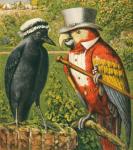 Tapper, on 20 April 2012 - 07:23 AM, said:
Tapper, on 20 April 2012 - 07:23 AM, said:
 Terez, on 10 April 2012 - 04:19 AM, said:
Terez, on 10 April 2012 - 04:19 AM, said:
Sure, there's a racial element between the Western World and the darker-skinned Islamic cultures
As a side-note: not all Islamic cultures were/ are dark-skinned. iirc, there are a great many 'Aryans' in the middle east: blond and blue-eyed (especially surprising since blue eyes are genetically regressive). There also seems to be at the very least circumstantial evidence that a large part of the Al-Andalusian sultanate was very light skinned, had blue eyes and had to die their hair and beard black thanks to the sheer amount of white harem wives they were having sexy time with. It is one of the reasons why I love Lions of al-Rassan so much: Ammar ibn Kharain is exactly the offspring of one such union.
So it isn't just that the ME were more diverse, it also is that there was inter-racial sex (although I am sure part of it wasn't entirely voluntarily) and thus, mixed offspring.
Yeah, I'm aware that they're not all dark-skinned, but it's relatively rare, and beside the point anyway, since we're really talking about Lewis's preconceptions, and those of his average reader. It was a bit stereotypical of him to make his Tash-worshipers dark-skinned, but I think his conscious motives were more rooted in the religious conflict.
Here's
another article on the subject, by Daniel Abraham on A Dribble of Ink.
_____
So there's this argument about epic fantasy that keeps coming up, and it makes me uncomfortable every time I see it. Usually it goes something like this: a beloved novel or series set in a world with kings and knight and dragons – that is to say one set in an imaginary medieval Europe – is analyzed and found somehow wanting. Not enough strong women, too many white people, too much sexual violence. As the debate fires up, one of the defenders of book or series makes some variation of the argument that fantasy that has the set dressings of medieval Europe is better if it also has medieval social norms. Or, at a lower diction, "But the Middle Ages really were sexist/racist/filled with sexual violence." And there, my dear friends, I get my back up. With all respect, this is a bad argument. If you don't mind, I'd like to run down my objections to it in hopes of putting a stake through this argument's rhetorical heart.
First off – and I include this only because it deserves to be said – history is more complex than a fantasy novel. The Middle Ages, for all their many faults, also included Moorsh Spain where religious tolerance and civilization flourished. Women in the 14th century England could own property and accumulate wealth. The argument that "it was really like that" assumed that there's a singular "it" that can be applied. There's not. That alone should be enough to stop this rhetorical strategy, but it's not the part of the argument that actually chafes me, so put it aside and let's pretend for a while that there was only one homogenous Middle Ages. And let's say that from the fall of Rome to the Enlightenment was one long uninterrupted stream sexual subjugation, racial hatred, rape, and plague. It wasn't, but let's pretend.
What would that say about contemporary epic fantasy set in a faux medieval world? That it should be like that too? That a story is made deeper, more powerful, better by cleaving to that? Would, to give a concrete example, the Chronicles of Narnia would be improved by plagues and vicious religious schism? I think it wouldn't. And I think there are many secondary world fantasies like it – Hughart's
The Bridge of Birds, Beagle's
The Last Unicorn, Kushner's
Swordspoint – that would obviously be poorly served by greater historical authenticity.
Which is to say the standard only applies to the projects it applies to.
So fine. We've dispensed with the authentic complexity of history. Now, let's cut out
The Chronicles of Prydain and
Thomas the Rhymer too. Let's pretend that the argument might make sense if we only talk about the subset of epic fantasies where the author is trying for authenticity. George RR Martin, Joe Abercrombie, R. Scott Bakker, Richard Morgan. The kinds of fantasies that pull no punches and show medieval life the way that (we're pretending for the sake of argument) it really was. In that context, argument has to hold true.
Except that it doesn't.
Here's a short list of how things really were in the real Middle Ages that, I think, match the popular understanding of them: religious, agrarian, lacking in cryptozoological discoveries.
The importance of God and the church in medieval Europe is the central cultural fact of the time, and the fear of damnation in the afterlife shaped everything from the creation of art to the customs of international banking. Surely everyone in these historically authentic fantasies must be pious, because the Middle Ages were really like that. After the fall of the Roman Empire, Western Europe had a massive ruralization that didn't start coming back to focus on large urban centers until the 1400s. Surely the majority of action in these realistic fantasies happens outside cities. And since there weren't any, dragons have to count as a huge minus.
Except that of course they don't. And what's more, they shouldn't.
The idea that the race, gender, or sexual roles of a given work of secondary world, quasi-medieval fantasy were dictated by history doesn't work on any level. First, history has an almost unimaginably rich set of examples to pull from. Second, there are a wide variety of secondary world faux-medieval fantasies that don't reach for historical accuracy and which would be served poorly by the attempt. And third, even in the works where the standard is applied, it's only applied to specific, cherry-picked facets of the fantasy culture and the real world.
At its heart, the argument that the Middle Ages were "really like that" misunderstands what epic fantasy is by treating it as though it was in conversation with actual history. It isn't. It's in conversation with the epic fantasy that came before it. George RR Martin (who, in the interest of full disclosure, is a friend and sometimes-collaborator of mine) has drawn a great deal from the incidents of real history, but he hasn't written a work of historical fiction. What gives his work its power isn't historical accuracy, but the subversion of genre expectations and a deeply-felt sorrow that infuses almost every scene. JRR Tolkien drew his inspiration not from medieval history but from medieval romances, and the Lord of the Rings isn't remembered for what it said about an imaginary 1300s, but what it said about (and to) a real 1950s. And 2010s. The roots of epic fantasy aren't with King William II. They're with King Arthur, and so they're timeless. Historical accuracy isn't what we come here for.
So why are people making the claim? Here's what it looks like to me:
There are legitimate reasons for racism, sexism, and sexual violence to be part of a fantasy project, and expressing how problematic elements serve a novel is tricky work. It invites conflict,, and the issues about what fiction is and should be aren't straightforward.
It's hard to have a piece of fiction that spoke to you – and by you I mean me – criticized, and this argument seems to come up almost exclusively in the context of defending a beloved work against criticism. When a critic points out something problematic in a book that we enjoyed (or, God forbid, wrote), it feels like a personal attack. Also this is the Internet, and the level of rhetorical violence with which the analysis is presented can sometimes leave welts. It's natural to reach come to the defense of the work, because that also feels like coming to the defense of the writer and the fans. We don't do our best thinking when we're defensive. Sometimes we make dumb arguments. This is one of those.
We'll have to do better.
___

 Help
Help






















